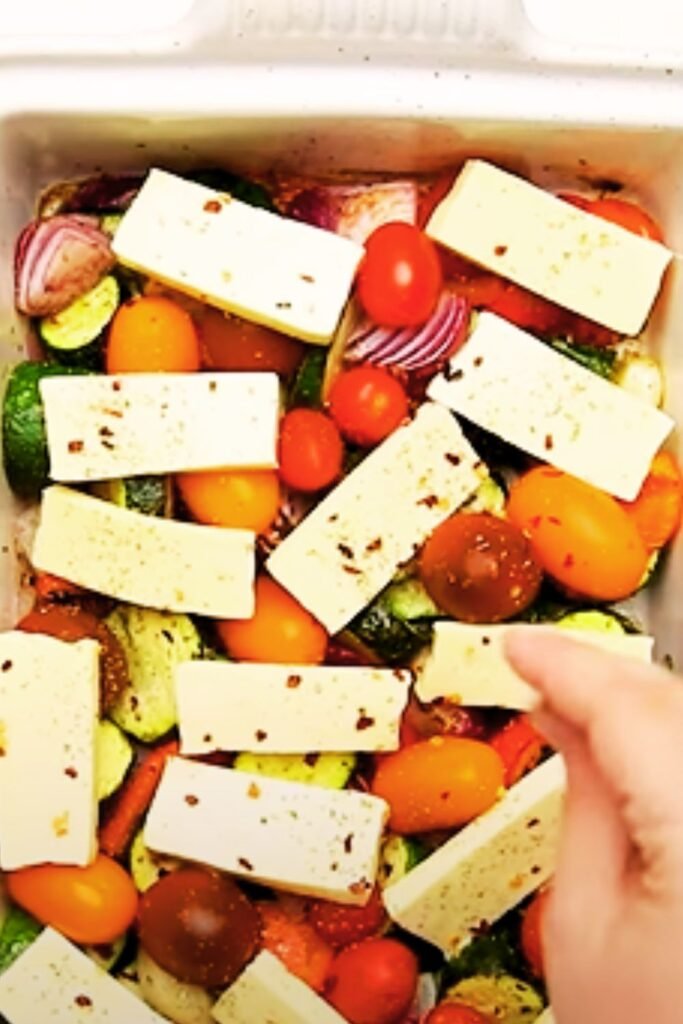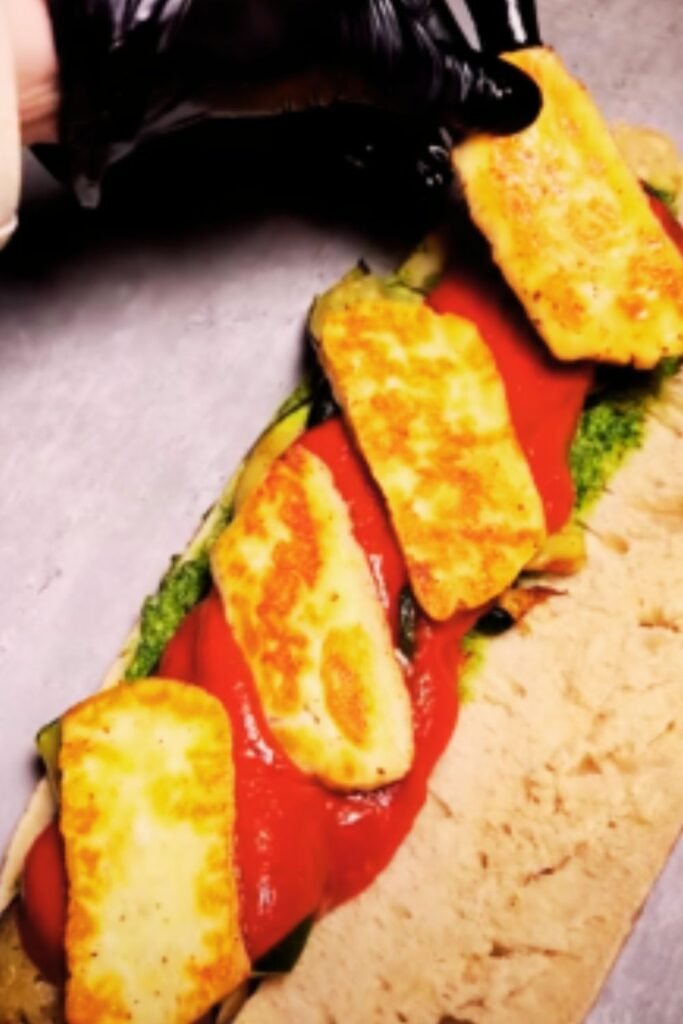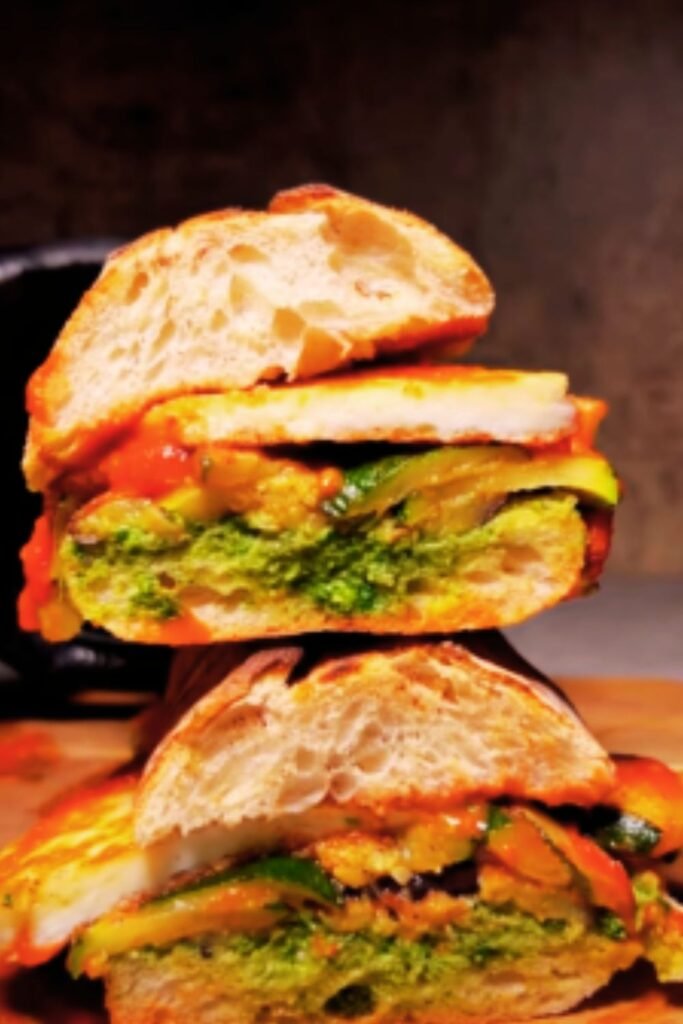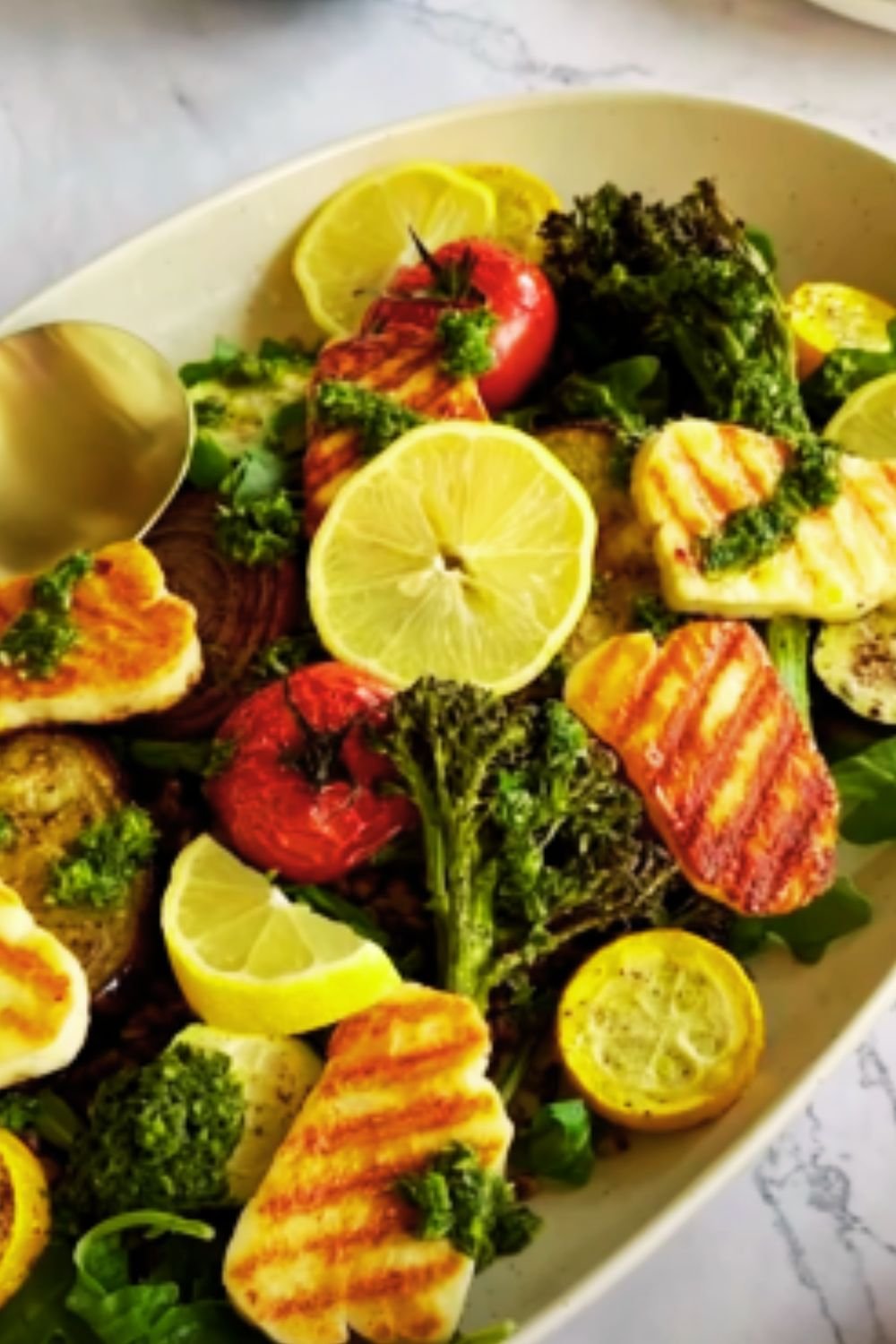There’s something magical about the combination of roasted vegetables and halloumi cheese that transports me straight to a sun-drenched terrace overlooking the Mediterranean Sea. This dish brings together the earthy sweetness of roasted vegetables with the salty, squeaky goodness of grilled halloumi – a match made in culinary heaven!
I’ve been perfecting this recipe for years, tweaking the vegetable combinations and marinade ratios to create what I believe is the ultimate Mediterranean-inspired dish. Whether you’re looking for a substantial vegetarian main course or a show-stopping side dish, this colorful medley delivers on both flavor and visual appeal.
What Makes Mediterranean Vegetables So Special?
Mediterranean cuisine has captivated food lovers around the world for centuries, and there’s good reason for its enduring popularity. The vegetables that feature prominently in Mediterranean cooking are not only delicious but also packed with nutrients that contribute to the famous health benefits of this regional diet.
When these vegetables are roasted, something truly transformative happens. The natural sugars caramelize, creating deep, complex flavors that simply can’t be achieved through other cooking methods. Add the unique texture and salty bite of halloumi cheese, and you have a dish that satisfies on multiple levels.
The Star Ingredients
Vegetables
Mediterranean cooking celebrates seasonal produce, and this dish showcases the best of what this region has to offer:
- Bell Peppers: Sweet and colorful, they become incredibly tender when roasted
- Zucchini: Absorbs flavors beautifully while maintaining a pleasant texture
- Eggplant: The meaty texture makes it a substantial addition
- Red Onions: They sweeten dramatically when roasted
- Cherry Tomatoes: Burst with concentrated sweetness
- Garlic: Becomes mellow and almost sweet
- Artichoke Hearts: Add a unique tanginess (I use jarred for convenience)
Halloumi Cheese
Halloumi deserves special mention here. This semi-hard, unripened cheese from Cyprus has a high melting point, which allows it to be grilled or fried without losing its shape. The contrast between its golden, crispy exterior and soft interior creates a wonderful textural experience.
Halloumi: : A brined cheese made from a mixture of goat’s and sheep’s milk (though cow’s milk is often used today). It has a high melting point that allows it to be grilled or fried without melting.
Herbs and Seasonings
The aromatics really elevate this dish:
- Fresh Oregano: More potent than dried, with a complex flavor
- Fresh Thyme: Adds earthy, slightly floral notes
- Fresh Rosemary: Provides a distinctive pine-like fragrance
- Fresh Basil: Added after cooking for a sweet, aromatic finish
- Lemon Zest: Brightens all the flavors
The Marinade
The marinade isn’t just a coating – it’s an essential component that infuses the vegetables with Mediterranean flavors:
Olive Oil: : The foundation of Mediterranean cooking, providing fruity notes and helping vegetables caramelize
Lemon Juice: : Adds brightness and helps tenderize the vegetables
Balsamic Vinegar: : Contributes sweetness and depth
Garlic: : Infuses everything with its aromatic flavor
Herbs: : Fresh or dried Mediterranean herbs complete the flavor profile
Nutritional Benefits

One of the reasons I love this dish is that it’s as nutritious as it is delicious. Here’s a breakdown of the impressive nutritional profile:
| Ingredient | Key Nutrients | Health Benefits |
|---|---|---|
| Bell Peppers | Vitamins A, C, B6, Folate, Potassium | Antioxidant properties, immune support, eye health |
| Zucchini | Vitamins A, C, B6, Folate, Potassium, Manganese | Low calorie, aids digestion, anti-inflammatory |
| Eggplant | Fiber, Potassium, Vitamins C, B6, K | Heart health, blood sugar regulation, antioxidants |
| Red Onions | Quercetin, Sulfur compounds, Vitamin C | Anti-inflammatory, immune support, heart health |
| Cherry Tomatoes | Lycopene, Vitamins C, K, Potassium | Cancer-fighting properties, heart health, skin health |
| Garlic | Allicin, Manganese, Vitamin B6, Selenium | Immune-boosting, anti-inflammatory, heart health |
| Olive Oil | Monounsaturated fats, Vitamin E, Polyphenols | Heart health, anti-inflammatory, antioxidant properties |
| Halloumi | Protein, Calcium, Zinc | Bone health, muscle maintenance, immune function |
| Fresh Herbs | Various vitamins, minerals, and antioxidants | Anti-inflammatory, digestive support, antioxidant properties |
When combined in one dish, these ingredients create a nutritional powerhouse that supports multiple aspects of health while delivering incredible flavor.
The Complete Recipe
Now, let’s get into the detailed recipe that will guide you through creating this Mediterranean masterpiece.
Ingredients
For the Roasted Vegetables:
- 1 large eggplant, cut into 1-inch cubes
- 2 zucchini, cut into half-moons
- 1 red bell pepper, chunked
- 1 yellow bell pepper, chunked
- 1 red onion, cut into wedges
- 1 pint cherry tomatoes, halved
- 6 garlic cloves, peeled and lightly crushed
- 1 jar (12 oz) artichoke hearts, drained and quartered
- 3 tablespoons olive oil
- 2 tablespoons balsamic vinegar
- Juice and zest of 1 lemon
- 2 teaspoons dried oregano (or 1 tablespoon fresh)
- 1 teaspoon dried thyme (or 1 tablespoon fresh)
- 1 sprig rosemary, leaves removed and chopped
- Salt and freshly ground black pepper to taste
- ¼ cup pine nuts (optional)
For the Halloumi:
- 8 oz (250g) halloumi cheese, cut into ½-inch thick slices
- 1 tablespoon olive oil
- 1 teaspoon lemon zest
- Pinch of red pepper flakes (optional)
For Garnish:
- Fresh basil leaves, torn
- Extra virgin olive oil, for drizzling
- Lemon wedges
- Flaky sea salt
Equipment Needed
- Large baking sheet(s)
- Parchment paper
- Mixing bowls
- Grill pan or non-stick skillet (for the halloumi)
- Sharp knife and cutting board
- Citrus zester or fine grater
Step-by-Step Instructions
Preparing the Vegetables
- Preheat the oven to 425°F (220°C) and line a large baking sheet with parchment paper.
- Prep your vegetables:
- Cut the eggplant into 1-inch cubes
- Slice zucchini into half-moons about ½-inch thick
- Core and cut bell peppers into 1-inch chunks
- Slice red onion into wedges, keeping the root end intact
- Halve the cherry tomatoes
- Lightly crush garlic cloves (don’t mince them – they’ll burn)
- Drain and quarter artichoke hearts
- Make the marinade by whisking together:
- 3 tablespoons olive oil
- 2 tablespoons balsamic vinegar
- Juice and zest of 1 lemon
- Dried or fresh herbs
- Salt and pepper to taste
- Toss the vegetables (except tomatoes) in the marinade, making sure they’re well coated. I like to use my hands for this to ensure even distribution.
- Arrange on baking sheet(s) in a single layer – don’t overcrowd or they’ll steam rather than roast. Use two sheets if necessary.
- Roast for 20 minutes, then add the tomatoes and pine nuts (if using) and roast for another 10-15 minutes until vegetables are tender and starting to caramelize at the edges.
Preparing the Halloumi

- While the vegetables finish roasting, prepare the halloumi.
- Pat the halloumi slices dry with paper towels. This helps achieve a better sear.
- Heat a grill pan or non-stick skillet over medium-high heat.
- Brush the halloumi with olive oil and sprinkle with lemon zest and red pepper flakes if using.
- Grill for 1-2 minutes per side until golden brown with nice grill marks. Don’t overcook or it will become too firm and rubbery.
Assembling the Dish
- Arrange the roasted vegetables on a serving platter.
- Top with grilled halloumi slices.
- Garnish with torn fresh basil leaves, a drizzle of your best extra virgin olive oil, and flaky sea salt.
- Serve immediately with lemon wedges on the side.
Pro Tips for Perfect Results
Having made this dish countless times, I’ve learned a few tricks that make a significant difference:
- Salt the eggplant: For best texture, toss eggplant cubes with salt and let them sit in a colander for 30 minutes before roasting. This draws out bitter juices and prevents them from becoming soggy. Rinse and pat dry before using.
- Temperature matters: Make sure your oven is fully preheated before roasting. A hot oven is essential for caramelization.
- Don’t crowd the pan: Vegetables need space to roast properly. If they’re too close together, they’ll steam instead of roast, resulting in mushy vegetables instead of caramelized ones.
- Add vegetables in stages: More delicate vegetables like tomatoes should be added later in the roasting process to prevent them from breaking down completely.
- Dry your halloumi thoroughly: Excess moisture prevents proper browning. Pat the cheese dry with paper towels before grilling.
- Hot pan for halloumi: Your pan should be properly heated before adding the cheese to achieve that perfect golden crust.
- Fresh herbs at the end: Add delicate herbs like basil after cooking to preserve their flavor and color.
Variations to Try

The beauty of this Mediterranean-inspired dish is its versatility. Here are some delicious variations I’ve experimented with:
Seasonal Adaptations
- Summer version: Incorporate fresh corn kernels, summer squash, and heirloom tomatoes
- Fall version: Add cubed butternut squash, brussels sprouts, and shallots
- Winter version: Include parsnips, carrots, and leeks
Protein Additions
- Chickpeas: Toss in a can of drained, rinsed chickpeas for the last 10 minutes of roasting
- Grilled chicken: Add sliced grilled chicken breast for a non-vegetarian option
- Feta substitute: If halloumi isn’t available, try thick slices of feta (though it won’t grill the same way)
Serving Suggestions
- Grain bowl: Serve over quinoa, bulgur, or farro for a complete meal
- Wrap it up: Use as a filling for warm pita bread with a smear of hummus
- Pasta mix-in: Toss with cooked pasta and a splash of pasta water for a quick dinner
- Alongside protein: Serve as a side dish with grilled fish or chicken
- Cold version: Enjoy leftovers cold as an antipasto salad
Dietary Adaptations
- Vegan version: Substitute halloumi with firm tofu marinated in nutritional yeast, lemon juice, and olive oil
- Lower carb option: Focus on non-starchy vegetables like bell peppers, zucchini, and eggplant
- Nightshade-free: Skip tomatoes, eggplant, and bell peppers; use cauliflower, Brussels sprouts, and zucchini instead
Storage and Make-Ahead Tips
This dish is perfect for meal prep! Here’s how to make it work:
- Make-ahead vegetables: Roast vegetables up to 3 days ahead and store in an airtight container in the refrigerator.
- Halloumi timing: For best texture, always cook the halloumi just before serving.
- Reheating: Reheat vegetables in a 350°F (175°C) oven for 10-15 minutes until warmed through.
- Freezing: The roasted vegetables can be frozen for up to 3 months. The texture may change slightly but they’ll still be delicious in soups and stews.
- Meal prep: Divide roasted vegetables into meal prep containers and add freshly grilled halloumi when ready to eat.
Mediterranean Diet Benefits
This dish embodies the principles of the Mediterranean diet, which has been consistently ranked as one of the healthiest eating patterns in the world. Research has linked this diet to numerous health benefits:
| Benefit | Research Finding |
|---|---|
| Heart Health | 25-30% reduced risk of cardiovascular events |
| Longevity | Average 4.4 years longer life expectancy |
| Cognitive Function | 40% reduced risk of cognitive decline |
| Weight Management | Sustainable weight loss without calorie counting |
| Type 2 Diabetes | 30% reduced risk compared to low-fat diets |
| Cancer Prevention | 13% reduced risk of cancer mortality |
| Inflammation | Significant reduction in inflammatory markers |
What makes the Mediterranean diet so effective is its focus on whole foods, healthy fats, and plant-based eating – all elements present in this roasted vegetable and halloumi dish.
Questions & Answers
Q: Can I make this recipe oil-free?
While olive oil is a traditional and nutritious component of Mediterranean cooking, you can reduce the amount used. Instead of tossing vegetables in oil, you could use a spray bottle to lightly mist them, or use a small amount of vegetable broth or balsamic vinegar as the base for your marinade. For the halloumi, a non-stick pan can eliminate the need for oil, though the cheese won’t brown as nicely.
Q: Is there a substitute for halloumi if I can’t find it?
Halloumi has a unique property of holding its shape when heated due to its high melting point. If you can’t find it, other options include:
- Bread cheese (juustoleipä)
- Queso para freír (frying cheese)
- Extra-firm paneer
- Thick slices of feta (though these will soften rather than grill)
- Firm tofu, well-pressed and marinated
Q: How do I know when the vegetables are perfectly roasted?
Perfectly roasted vegetables should be tender when pierced with a fork, with caramelized, slightly browned edges. They should maintain their shape rather than turning mushy. Each vegetable has a slightly different ideal texture – peppers and onions should be soft and sweet, while zucchini and eggplant should be tender but not collapsed.
Q: Can I grill the vegetables instead of roasting them?
Absolutely! Grilling adds a wonderful smoky flavor. Cut the vegetables slightly larger so they don’t fall through the grates, brush them with the marinade, and grill over medium heat until tender and lightly charred. The halloumi is particularly delicious when grilled outdoors.
Q: What are some complementary side dishes?
This is quite a complete meal on its own, especially when served with a grain. However, some complementary sides include:
- Greek salad
- Warm pita bread
- Tzatziki for dipping
- Simple couscous
- Mediterranean bean salad
- Lemony soup (avgolemono)
Q: How can I reduce the saltiness of halloumi?
Halloumi is naturally salty from the brining process. To reduce saltiness, soak slices in cold water for 10-15 minutes before cooking, changing the water once or twice. Pat thoroughly dry before cooking to ensure proper browning.
Final Thoughts
There’s something deeply satisfying about creating a dish that brings together the best flavors of the Mediterranean – the sweetness of roasted vegetables, the earthiness of herbs, the bright acidity of lemon, and the salty satisfaction of halloumi.
I hope this recipe brings some Mediterranean sunshine to your table, whether you’re making it for a family dinner, a dinner party, or just treating yourself to something special. The combination of colors, textures, and flavors makes this dish a feast for all the senses – proving that vegetable-forward cooking can be both nutritious and incredibly delicious.
Remember that cooking is always about making something your own, so don’t hesitate to adapt this recipe to your preferences or what’s available in your area. The Mediterranean approach to food is less about strict recipes and more about celebrating good ingredients prepared simply and with love.
Enjoy your culinary journey to the Mediterranean!


